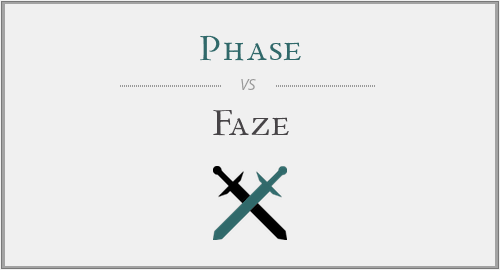Phase vs. Faze: Navigating Homophones in Language
Homophones, words that sound the same but have different meanings and spellings, can be a source of confusion. "Phase" and "faze" are examples of such homophones. This article aims to clarify the distinctions between "phase" and "faze," shedding light on their meanings, applications, and appropriate usage in various contexts.
Correct Usage:
Phase:
"Phase" is a noun or verb used to describe a distinct stage or step in a process, plan, or development. As a noun, it refers to a period or step in a sequence. As a verb, it means to introduce or implement something gradually or in stages.
Faze:
"Faze" is a verb indicating the act of disturbing, unsettling, or causing someone to feel uneasy or intimidated. It describes an emotional reaction to a situation but does not imply a physical impact.
Meanings and Applications:
Phase:
Use "phase" when referring to a specific stage or step in a process, plan, or development. It describes a period or point in a sequence and is often used in contexts related to projects, scientific endeavors, or plans.
Faze:
Use "faze" when describing the emotional impact of something that disturbs or unsettles a person. It refers to the psychological response to a situation and is not tied to physical changes or stages of development.

Examples:
Correct: The construction project is currently in the planning phase, with detailed designs being developed.
Correct: Despite the challenges, her confidence was not easily fazed, and she continued with determination.
Contextual Considerations:
Consider the context and subject matter when choosing between "phase" and "faze." If discussing stages in a project or plan, "phase" is appropriate. If describing an emotional reaction to a situation, "faze" is the correct term.
Conclusion:
Navigating the distinctions between "phase" and "faze" ensures precise communication and avoids confusion in both written and spoken language. Whether discussing project development or emotional resilience, understanding the specific meanings of these homophones enhances clarity and accuracy in expression.




Have a discussion about this article with the community:
Report Comment
We're doing our best to make sure our content is useful, accurate and safe.
If by any chance you spot an inappropriate comment while navigating through our website please use this form to let us know, and we'll take care of it shortly.
Attachment
You need to be logged in to favorite.
Log In